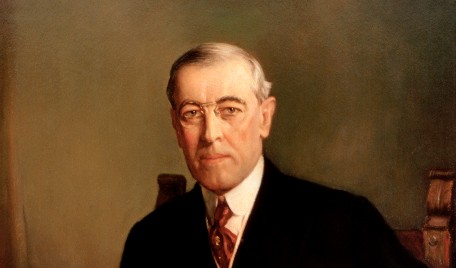On the occasion of his birthday, Constitution Daily looks at some unusual facts related to one of the more controversial Presidents, Woodrow Wilson.
Today, the controversy over Wilson involves his legacy at Princeton University, where a debate continues about Wilson’s racial viewpoints during his lifetime. But Wilson was also controversial as Princeton’s president before his sudden rise to the White House. And his eight years in office didn't lack drama.
Here’s a quick look at 10 fascinating facts about the 28th President.
1. Wilson experienced the Civil War in his youth. Born on December 28, 1856 in Virginia, young Thomas Woodrow Wilson was present in Georgia when Union troops entered his town and his mother tended to wounded Confederate soldiers.
2. As a child, Wilson saw Robert E. Lee. Young 13-year-old “Tommy” Wilson and his father were at a procession in Augusta, and the future president stood next to General Lee at the event.
3. Wilson did eventually attend Princeton as a student. After a brief time at Davidson College, Wilson would up in New Jersey at Princeton, where he graduated 38th in his class of 167 students.
4. Wilson was a professional historian and political scientist. After a brief law career, Wilson settled into an academic career that lasted until 1910. He was a professor at other schools, and then returned to Princeton, where he was named president in 1902.
5. Wilson only had a little over two years of political experience when he became President of the United States. After his Princeton career, Wilson won election as New Jersey’s governor in 1910, and just two years later, he was in the White House.
6. The 1912 election wasn’t a popular landslide. Wilson won easily in the Electoral College against the divided William Howard Taft and Theodore Roosevelt factions, but his 42 percent popular vote total was the third-lowest winning tally in history.
7. Wilson put the first Jewish justice on the Supreme Court. In 1916, the President pushed for Louis Brandeis to be named to the high court against fierce opposition. In the end, Wilson prevailed.
8. Wilson’s health problems led to constitutional change. The frail Wilson had a history of health issues, but stress related to promoting the League of Nations led to a series of strokes in 1919. The partially incapacitated Wilson remained in office until 1921. Eventually, the 25th Amendment, ratified in 1967, allowed for constitutional measures to deal with temporary or permanent incapacity of the President in office.
9. Wilson made the first live remote national radio broadcast. In November 1923, shortly before his death, Wilson spoke to a national audience just before Armistice Day from his Washington, D.C. home. The next day, 20,000 people showed up at his house to hear a few more words from the former President.
10. Wilson is the only U.S. President buried in Washington, D.C. The 28th President is in a sarcophagus at the Washington National Cathedral. William Howard Taft and John F. Kennedy are interred at Arlington, Virginia.








